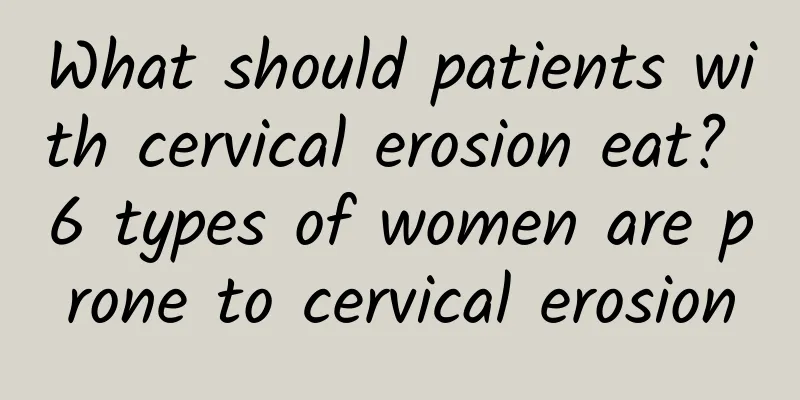What should patients with cervical erosion eat? 6 types of women are prone to cervical erosion

|
Originally, cervical erosion is common in middle-aged and elderly women, which is a normal physiological phenomenon. However, the probability of young women suffering from this disease is gradually increasing. The reasons for the high incidence of cervical erosion are related to long menstruation, early sexual life, excessive cleaning, etc. Let's find out. Cervical erosion "specifically" targets 6 types of women 1. Unclean sexual life Since premarital sex is mostly kept secret, and young people do not have a stable source of income and cannot create a stable and clean sexual environment, the probability of getting sick is greatly increased. 2. Having sex too early and having too many sexual partners Premature sexual activity, frequent changes of sexual partners, and excessive sexual intensity are causes of cervical erosion that cannot be ignored. 3. Excessive cleaning There are many female cleaning products on the market. If they are not chosen properly and a high concentration of disinfectant is used to flush the vagina, it will not only affect the growth of normal vaginal flora and reduce its ability to inhibit bacteria, but will also cause varying degrees of cervical epithelial damage and eventually erosion. 4. Multiple artificial abortions Multiple abortions, diagnostic curettage, cervical dilation and other gynecological surgeries caused by premarital sex may lead to cervical injury or inflammation, and ultimately cause cervical erosion. 5. Persistent vaginitis Most cases of cervical erosion are caused by vaginitis that is not treated optimally. 6. Menstruation lasts too long Studies have shown that cervical erosion is related to the menstrual cycle and the duration of the menstrual cycle: the prevalence rate for those with a menstrual cycle of ≤20 days is 81.80%, and the prevalence rate for those with a menstrual cycle of ≥20 days is ≤43.81%; the prevalence rate for those with a menstrual cycle of ≤2 days is only 33.33%, and the prevalence rate for those with a menstrual cycle of ≥8 days is 83.33%. Therefore, women with short cycles and long durations are more likely to develop cervical erosion. In life, some women have abnormal menstruation, and it is unexpected that prolonged menstruation can also lead to the occurrence of cervical erosion. What should patients with cervical erosion eat? 1. The diet should be light and avoid eating irritating foods such as mutton, shrimp, crab, eel, salted fish, and black fish. 2. Eat more lean meat, chicken, eggs, quail eggs, crucian carp, turtle, white fish, cabbage, asparagus, celery, spinach, cucumber, winter melon, mushrooms, tofu, kelp, seaweed, fruits, etc. 3. You can eat some Yin-nourishing foods and take some Qi-replenishing and blood-replenishing medicines. 4. Protein is an important component of antibodies. If it is not taken enough, the body's resistance will be reduced. Within half a month after surgery, protein should be given 1.5 to 2 grams per kilogram of body weight, and the daily amount is about 100 to 150 grams. Therefore, you can eat more chicken, lean pork, eggs, milk, beans, bean products, etc. 5. On the basis of a normal diet, limit fat appropriately. The fat should be controlled at about 80 grams per day within one week after surgery. People with menstrual disorders should avoid eating irritating foods, such as chili peppers, wine, vinegar, pepper, ginger, etc. These foods can stimulate congestion of sexual organs and increase menstrual volume. Also avoid eating cold foods such as crabs, snails, and river clams. 6. After cervical erosion surgery, the body is weak and prone to sweating. Therefore, water should be replenished in small amounts and multiple times to reduce water evaporation; sweat excretes more water-soluble vitamins, especially vitamin C, vitamin B1, and vitamin B2, so you should eat more fresh vegetables and fruits. This is also helpful to prevent constipation. 7. Do not eat spicy or irritating food, because it will aggravate pelvic congestion and inflammation, or cause excessive contraction of the uterine muscles, which will aggravate the symptoms. For example, you should also eat less hot, coagulant, and hormone-containing foods such as chili, pepper, garlic, onion, ginger, leek, chicken soup, durian, longan, red dates, donkey-hide gelatin, royal jelly, etc. |
Recommend
What are the symptoms of tumorous ovarian cysts?
Ovarian cysts are a type of tumor in a broad sens...
Decoding the dangers of bacterial vaginosis
Patients need to correctly understand the dangers...
What kind of examinations do women need to do after abortion? Women should pay attention to 4 things after abortion
After an abortion, you need to have a follow-up e...
Brief analysis of clinical symptoms of chronic pelvic inflammatory disease
Many people may have heard of chronic pelvic infl...
How to detect adnexitis
Adnexitis can be diagnosed through gynecological ...
What medicines can cure cervical erosion? These medicines are effective in treating cervical erosion
Many women will have gynecological inflammation f...
Is it easy to succeed in medical abortion for anterior uterus? Is it better to have surgical abortion or medical abortion for anterior uterus?
The success rate of medical abortion for anterior...
Experts explain to you what dysmenorrhea is
Dysmenorrhea is a common gynecological disease. W...
Build a slim body without worrying about getting fat! Dr. Xiao Dunren: Take protein after exercise to help control your weight
Many people exercise to lose weight, but they are...
When is the best time to have an abortion? What is the best time to have an abortion with medicine?
With the development of today's society, peop...
What should a 19-year-old girl do if her period is 13 days late?
What should a 19-year-old girl do if her period i...
Excessive dieting can also cause irregular menstruation in women
Irregular menstruation is a very common physiolog...
Do you know how much does ectopic pregnancy surgery cost?
According to experts, the treatment principle of ...
Early symptoms of ectopic pregnancy
The initial symptoms of ectopic pregnancy include...
[Video version] What should you eat after vaccination for the best protection?
As the number of COVID-19 vaccines donated to Tai...


![[Video version] Are mangoes poisonous? Should we eat less of them? 3 points to pay attention to without burden! Nutritionists explain where the “poison” comes from…](/upload/images/67dcf37ecaf05.webp)






